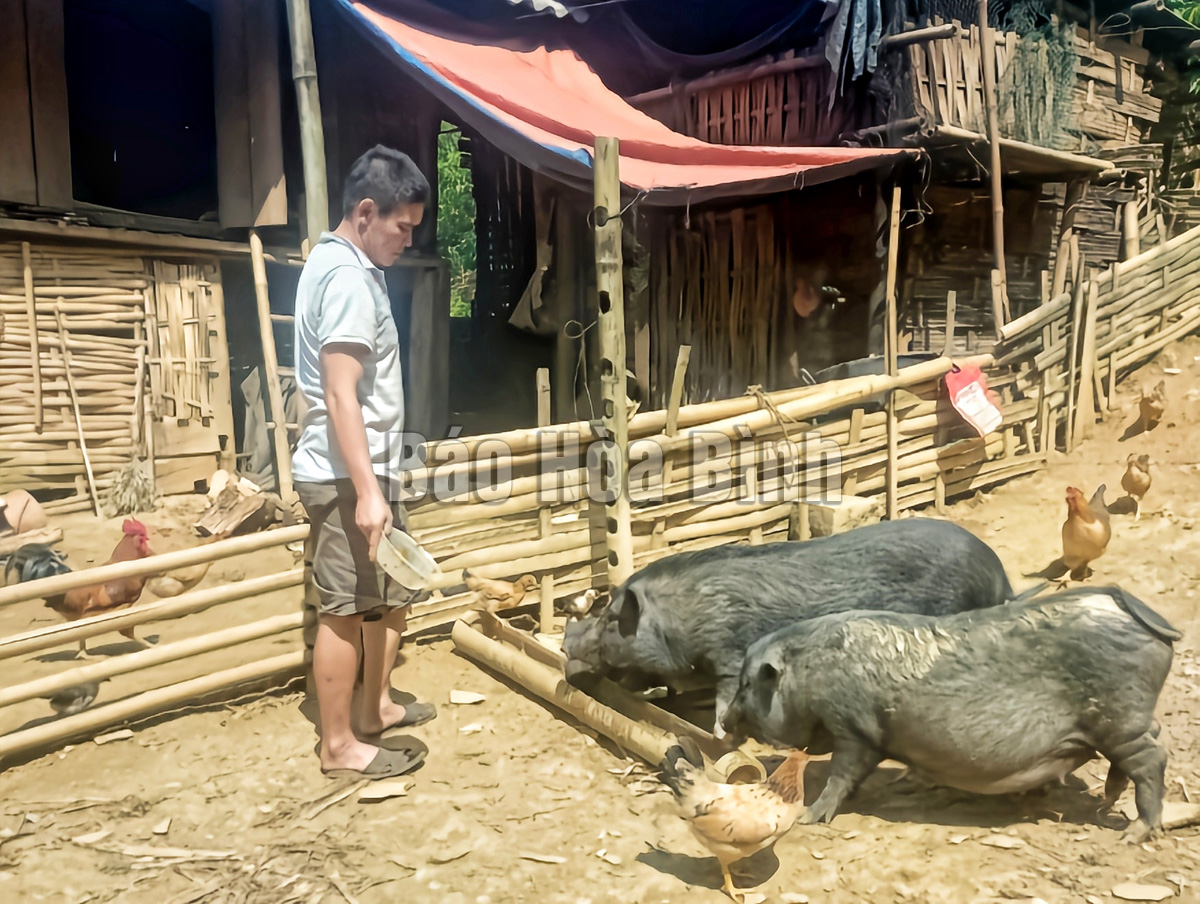
(HBO) - In recent years, farmers in Ngo Luong commune, Tan Lac district, have focused on raising animals native to the land, hence the formation of products imbued with the local identity, serving the future growth of tourism.

Bui Van Inh's family in Bo Tram hamlet, Ngo Luong,
develops indigenous pig breeding, reaping positive economic outcomes.
Ngo Luong is a difficult mountainous commune lying 30 km
away from the district’s centre. It houses four hamlets with 351 households
grouping 1,650 people. The local rates of poor and near-poor households in the
locality now stood at 24.29% and nearly 29%, respectively. Despite its
difficulties, Ngo Luong is a land of potential and advantages with high forest
coverage, a fresh climate, and a natural landscape that still retains many wild
features.
Bui Van Thai, Vice Chairman of the Ngo Luong People's
Committee said the locals raise cattle and poultry. As for their pig herd,
there are currently over 1,200 heads, about 70% of which are native black pigs.
Raising indigenous black pigs is suitable for local conditions and enjoys
favorable prices and output despite falling prices in the market. Therefore,
many households involved have seen their incomes improve.
Currently, 200 local households are joining the farming of
the black pigs. Bui Van Hung in Bo Tram hamlet runs a herd of 100 pig heads
reared in a one-ha area. Hung said the locality houses grazing grounds and
abundant food sources, suitable for raising the black pigs. Moreover, the
animal’s output is quite stable, with its current price being about 120,000 VND
(5.12 USD) per kg.
In the 2023 – 2025 period, livestock development in Ngo
Luong is set to receive regular support from the sub-department of livestock
and veterinary medicine regarding vaccination work and technical training. The
assistance is expected to help control diseases and create products with strong
local identity, attracting tourists and accelerating the process of hunger
eradication and poverty alleviation./.
According to data from the Hoa Binh Provincial Party Committee, the industrial production index for the first six months of 2025 is estimated to have increased by 20% compared to the same period last year. This marks the highest year-on-year growth rate for this period since 2020.
In the first six months of 2025, Hoa Binh province’s export turnover was estimated at 1.145 billion USD, marking an 18.11% increase compared to the same period in 2024. Import turnover was estimated at $ 804 million, a 17.15% increase, which helped the province maintain a positive trade balance.
The lives of the ethnic minority farmers in Tan Lac district have gradually improved thanks to the new directions in agricultural production. This is a testament to the collective strength fostered through the professional associations and groups implemented by various levels of the district’s Farmers’ Union.
With the motto the "product quality comes first,” after nearly one year of establishment and operation, Muong village’s Clean Food Agricultural and Commercial Cooperative, located in Cau Hamlet, Hung Son Commune (Kim Boi district), has launched reputable, high-quality agricultural products to the market that are well-received by consumers. The products such as Muong village’s pork sausage, salt-cured chicken, and salt-cured pork hocks have gradually carved out a place in the market and they are on the path to obtaining the OCOP certification.
In the past, the phrase "bumper harvest, rock-bottom prices" was a familiar refrain for Vietnamese farmers engaged in fragmented, small-scale agriculture. But today, a new spirit is emerging across rural areas of Hoa Binh province - one of collaboration, organisation, and collective economic models that provide a stable foundation for production.
Maintaining growing area codes and packing facility codes in accordance with regulations is a mandatory requirement for agricultural products to be eligible for export. Recently, the Department of Agriculture and Environment of Hoa Binh province has intensified technical supervision of designated farming areas and packing facilities to safeguard the "green passport" that enables its products to access international markets.



